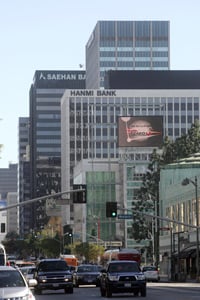
Hanmi Financial Corp. threw in the towel last week on its latest attempt to raise capital, and sources say the decision rested on a key issue: the dilution of stakes of insiders and other large shareholders.
More than a week and half after first announcing the $75 million offering, which had been fully subscribed, Hanmi Bank’s parent pulled the plug on the deal June 30.
If the offer had priced at the stock’s June 29 closing price of 91 cents, for example, Hanmi would have had to sell more than 68 million shares to obtain gross proceeds of $75 million, increasing total outstanding shares by 45 percent.
Directors – and Chairman Joseph Rho in particular – were adamant that the sale price needed to be higher, according to people familiar with the decision. With more than 2.9 million shares, Rho has the third largest stake and is the largest individual shareholder.
Hanmi’s share price jumped nearly 18 percent to close at $1.07 the day the offering was canceled. Bank experts, speaking on background, said the activity was prompted more by short sellers covering their positions than longtime investors cheering the abandonment of the dilutive offering.
Julianna Balicka, an equity analyst at Keefe Bruyette & Woods, said that the offering was highly dilutive because there was simply little enthusiasm for it, requiring Hanmi to lower the share price. The sale was widely perceived as more of a defensive effort to plump the bank’s capital cushion.
“It’s a tough market in general for banks coming to the market for recapitalizations this late in the game,” Balicka said. “It’s one thing if you come to the market with a defined opportunity, like an acquisition, but for a bank still struggling to recover from the credit crisis, it’s a problem.”
Fresh capital
Hanmi first disclosed in November 2009 that regulators had ordered it to raise $100 million in fresh capital by July 2010 or face seizure by the government.
In May 2010, the bank reached an agreement for Seoul, South Korea’s Woori Finance Holdings Co. Ltd. to obtain a majority stake by purchasing up to $240 million of Hanmi’s stock.
Woori, which has had a U.S. subsidiary since 1984, had hoped the $240 million deal would lead a larger footprint in California’s significant Korean-American community. Woori America, which only entered California in 2006, also had been hurt by the recession.
Anticipating it would not receive approval of the Woori deal by July 2010, Hanmi raised more than $120 million from two private placements that narrowly returned the bank to what regulators consider well-capitalized status by the deadline.
Hanmi finally abandoned the Woori deal last month as approvals in both countries dragged on. However, Hanmi continued to seek more capital and work with Woori, and last month the banks announced they were entering into a strategic alliance that would benefit customers doing business in each other’s countries. Woori also said early last week that it intended to participate in the $75 million stock sale.
If the sale had proceeded, Woori would have gained a more modest 4.9 percent stake in its new partner, still becoming one of Hamni’s largest shareholders. Cancellation of the offering sends the banks back to the drawing board to perhaps negotiate a private placement, unless Woori buys shares on the open market.
Hanmi executives said their bank can afford to be patient.
“Recent market volatility, particularly as it affects financial stocks, has created an environment in which many stocks are undervalued, including, we believe, our company’s shares,” said Chief Executive Jay Yoo in a prepared statement. “Because we currently have a strong capital position, we have decided to wait for an improved market environment.”
The pending merger of Nara Bancorp Inc. and Center Financial Corp., which will create the nation’s largest Korean-American bank, has triggered a scramble among other Korean-American banks in Los Angeles to shore up their finances and seek alliances.
Several smaller banks in the sector, including Wilshire Bancorp Inc. and Saehan Bancorp, have successfully raised money to recapitalize in recent months through public stock sales and private placements.
